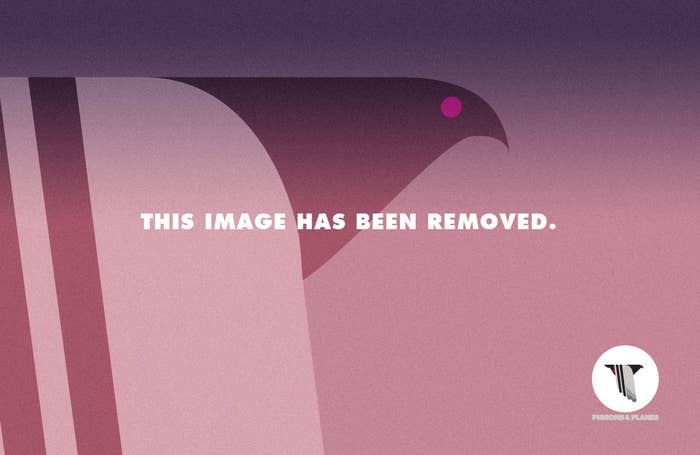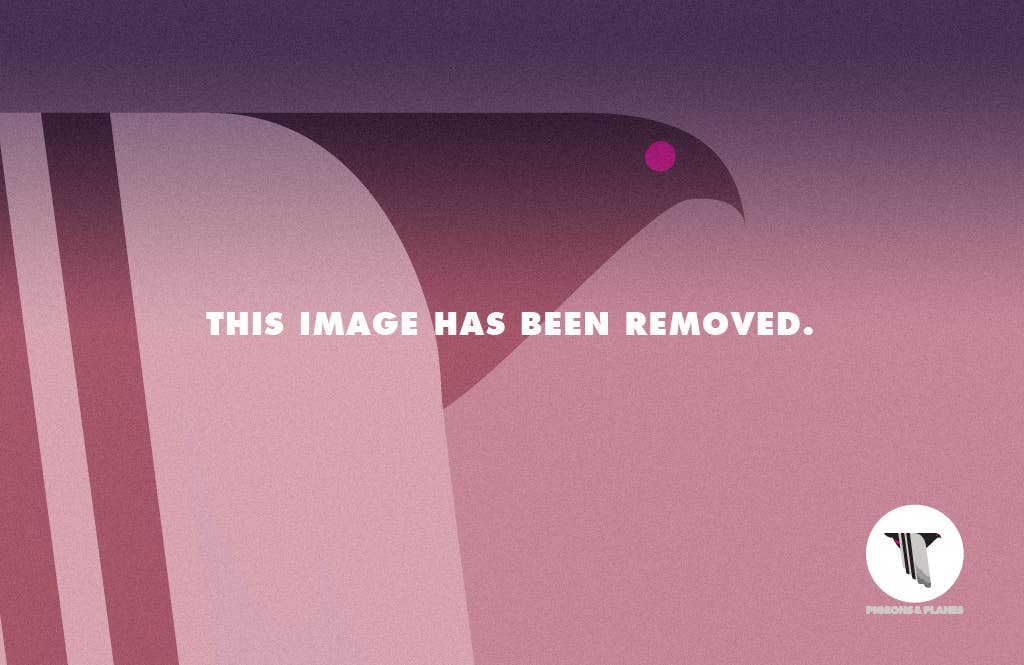1.

In the downstairs canteen of Leeds’ recently refurbished Belgrave music hall, there is a strong rumbling coming through the ceiling, and the 6pm dinner-time customers have started to notice. The volume on Clipse’s minimal classic “Grindin,” begins to creep up over the sound system, but it does little to mask the rattling above. “It sounds like we’re in a spaceship,” comments one customer.
Dark, labyrinthine stairs at the back of the venue also echo with menacing noise–the product of Edinburgh trio Young Fathers’ soundcheck. A collage of rapping, singing, electronically programmed African polyrhythms, and bagpipes (set against anything else that piques their interest), Young Fathers’ music is an adventurous, stark melting pot of genre infidelity. New album Dead sprawls the group’s ambitious vision out over eleven songs and 34 minutes—a runtime that feels far longer in the best way, almost over-stuffed with exciting ideas.
Ally Massaquoi and Kayus Bankhole, both sunk into a brown leather couch in the dressing room, wait for Graham ‘G’ Hastings, who soon joins after overseeing the pre-show din.
So, you guys originally met at the Bongo Club in Edinburgh?
Graham: Under 16’s hip-hop night, happened every two weeks.
How long after that first meeting did you start making music together?
Ally: I think it was straight away in the sense that we met that night and arranged to meet up in Graham’s house and just start recording. Start writing songs and stuff.
G: The guys came to my house and we set up the karaoke machine, I’d made beats on this little shitty thing on my computer, and I put the CD in the karaoke machine because it was the only thing I could figure out that would work. And you just have to play it. So I made the beat like six minutes long so we could all fit in, and just let it play, and everyone would push in to get their shot.
And was it just straight rapping at this stage?
A: No it was songs, from straight away, it wasn’t even really like lets just rap on a beat, it was like lets try and write songs. We never even said “lets write songs,” we just started writing songs.
G: Because there was a lot more people doing it when we were younger, there was a lot more people around that wanted to rap. But the three of us stuck together naturally because we wanted to write songs, we wanted to write structured like, “the chorus comes in there,” and it was hard to record it because you’re doing it live in front of a fucking karaoke mic, but it was good.
And from there you went on to do open mic nights, how was that experience?
Kayus: We never really did it in a traditional way.
G: Everybody would go up 8 Mile style, fucking angry with the hood up, cupping the mic, like anger pure anger. And we’d go up and do like the structured songs and move about on stage and stuff. The girls liked it…
A: Yeah they did! I think we used it for a platform, to get what we were doing across. We’ve done this song, lets see what it sounds like, that was the main thing. It wasn’t like we were angry at the people doing the 8 Mile battle style, it was just like they did that and we did this.
It’s one of the things that made hip-hop really conservative, that whole mentality of ‘being real’ and all that shit! It’s just fucking bullshit!
I’m from Newcastle and I know that the scene there has an accent barrier similar to what the Scottish scene struggles with, but the way that you manipulate your accents within your music allows you to escape that whole issue. Was that ever a conscious thing to use multiple accents?
K: Nah never at all. English is not my first language anyway, so it didn’t matter to me. Obviously there’s some words that sound better in a certain way, then you just say them, because it comes across more and it has more of an impact being said in that way. But for us we never concentrated and said, “Ahh yeah, lets be Scottish lads…”
A: “Your family’s from Nigeria but you stayed in the States, so you do this accent.” Or, “I’m from Liberia so I have to do an African accent.” We didn’t even think about it in that sense. And funnily enough, the people we were around at the time, a lot of underground folk, it was an issue for some of them. But it doesn’t matter! If anything, I find that the people who consciously go, “I’m going to do it in this accent,” even more fake! It’s a performance, that’s what it is, so it doesn’t even matter.
K: At the end of the day someone will be doing one accent and then they’ll come up to you after like, “Oh, hello,” in the Queen’s English, and speak very proper…
A: It’s keeping it real to yourself, that’s what it is, because we’re creative. It’s almost like people want to restrict you to what you look like or where you’re from. It doesn’t make sense…
G: It’s one of the things that made hip-hop really conservative, that whole mentality of “being real” and all that shit! It’s just fucking bullshit!
And that’s allowed you to be more creative.
G: Yeah it’s just more about what it sounds like. Whatever sounds good.
I read that you sometimes force the experimentation if you have to, under the ideology that, “You might like it in the morning.”
G: Yeah, yeah. Because there’s no rules. People say you can’t force music but sometimes you can force it and it sounds good in the morning. There’s no rules to it. If you’re really not in the mood to sing something, that might be the best time to sing something. If one of us hated a line, but two of us liked it, then the democracy has spoken: you have to sing that line. And in the morning we’ll see how you feel about it. And in the morning we’ll usually all come around to it.
A: Because at the end of the day we all want the best thing, it needs to be right for everybody.
K: In us having a brotherhood with each other we argue, and we fight, and I think that’s the most healthy thing as well, because we’re pushing each other.
4.

As much as you try to be fucking cool, you won’t sing something because you’re scared of how cool you’re gonna look? We don’t have that. None of us give a fuck about being cool or anything like that.
There are a lot of “urban” acts in the UK right now that aren’t conforming to how the industry might normally want to package them. Is this something that you are conscious of?
A: It’s not a conscious decision like, “We’re going to go against that!” We’re just making music that we want to listen to. If you want to be a pop artist you have to worry about making hit after hit after hit, and then you have to worry about other artists having another hit, and you’re up against them. So it’s this continuous worry about the next thing instead of just doing what you want. That’s it. Doing what you want and having the balls to say, “This is the music I want to make,” and making a go of it. Not worrying about all of that bullshit.
G: What Ally’s saying about pop artists, you have that with urban artists or credible underground artists, trying to work on that fact that, “Oh shit I need to work on that, I need to keep my credibility.” And that in itself can stunt your growth as well. As much as you try to be fucking cool, you won’t sing something because you’re scared of how cool you’re gonna look? It works on the other scale. We don’t have that. None of us give a fuck about being cool or anything like that.
At what point did you start taking music seriously and considering it as your career?
G: I think we’ve been taking it seriously since we were about 15! At first we met and we were all kinda just figuring each other out. At that age we were making songs at my mum’s and she would chuck us out at like 10pm, and we’d walk to the bus stop imagining what the video would look like. And it was serious, we’ve always taken it seriously, it was never like a laugh for us. It’s what we want to do, and we feel strongly about it.
And the records seem to get progressively darker as your career goes on, why do you think that is?
G: I don’t know. It’s funny because I think what people perceive as darkness, for me is like fucking hope. When we put “Deadline” out people were like, “Oh, their sound’s got a lot darker,” but to me it was like a beam of light. Like a war song, once everything’s finished, the sunshine–
K: It’s the victory march!
I don’t know if you’ve ever been to church and they’re singing songs of praise and everything feels so amplified. But if you take a time and you listen to it what you’re listening to is actually like a joyful song, and everything is high hopes and high spirits…And you want to cry, but you’re like, “Why do I want to cry? He’s talking about good shit!” It’s that kind of feeling.
I guess that maybe “dark” is the wrong word, and that the music has just become denser, which makes it feel heavy–
K: Yeah yeah! [Laughs]
A: It’s that thing, it’s not throwaway.
G: I think with Dead, because we wrote a lot more for it, there was a process of elimination. The, “That line’s not good enough,” kinda thing was done naturally. So that’s why it came out like it did. Because we didn’t listen to it throughout the recording process, it was a surprise to us when we listened back to what we’d recorded over the past three months. We were like: “Fucking hell! That’s heavy eh?” And not heavy as in, “That’s heavy!” like “What were we on?”
K: I don’t know if you’ve ever been to church and they’re singing songs of praise and everything feels so amplified. But if you take a time and you listen to it what you’re listening to is actually like a joyful song, and everything is high hopes and high spirits. There’s a Sam Cooke song, “Jesus Be With Me,” and it sounds so epic like so powerful and when you hear it you feel like “Oh shit.” And you want to cry, but you’re like, “Why do I want to cry? He’s talking about good shit!” It’s that kind of feeling.
What should people expect from your live show?
A: They should expect, passion, physicality on stage.
K: You never know what to expect when you’re in a different environment, especially when you’ve travelled to come to it because people’s perception will be completely different. So you can’t really expect anything.
G: We have low attention spans so we can’t copy and paste gigs. Every time we play you’ll get a completely new show that will never happen again. We get bored so quickly. So one night we might be running about fucking manic because we’re full of energy, but then another night we might not feel like it so we might be standing still, but we’ll still be trying to get something across–you’re realizing that, “Maybe it’s better to stand still, at this point in the song.
A: We’re always going to be passionate about performing because it’s another level that we’re bringing to the table. So if you see the artwork, see the videos, hear our songs, see us live, it all builds up and excels and takes it to another level. We’re always going to be passionate about what we do. That’s the continuity of what we do: to be passionate and be true to ourselves.
Listen to Young Fathers’ latest album Dead here.

